An outline of the path for the rest of the semester and for this research paper, mapped out here.
Author Archives: lewis
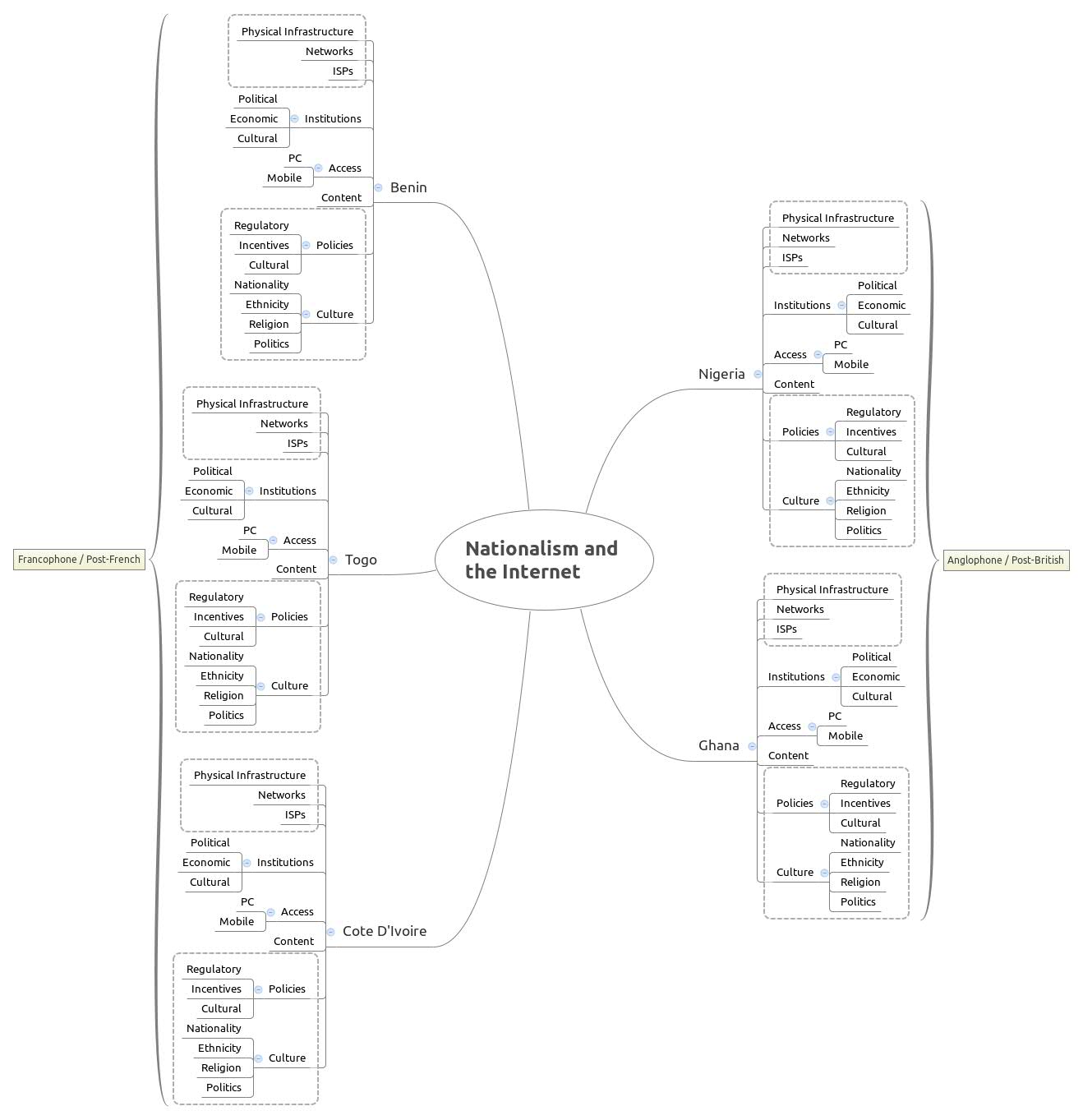
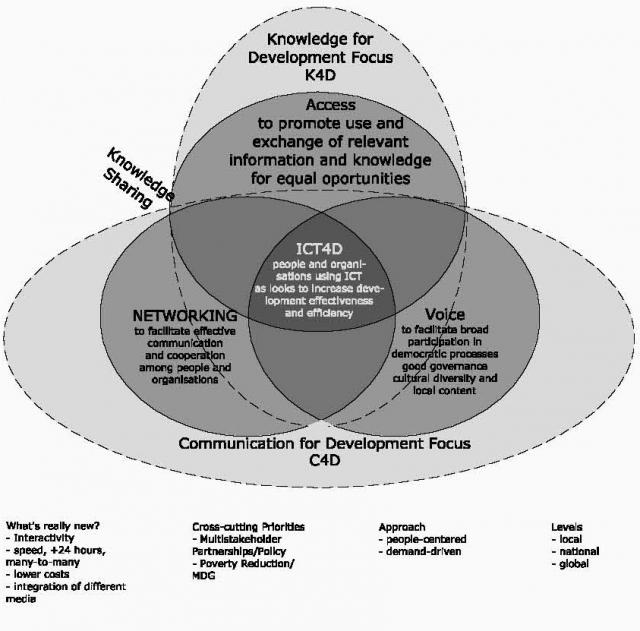
Literature Reviews
Livingston, Steven. Africa’s Evolving Infosystems: A Pathway to Security and Stability. Africa Center for Strategic Studies. Research Paper No. 2, 2010.
Livingston details the effects of the rapid growth of ICTs on governance in Africa. ICTs have no inherent political valence, and can be used for criminal or violent means as well as for human benefit. But Livingston argues that, in contrast to previous generations’ experience with the politically malicious use of communication tools to propagate insecurity and violence, new ICTs are improving security and economic development continent-wide, because they develop in tandem with democratic institutions and are being used to promote transparency. He also stresses the importance of scientific research to support political technology policy and investment.
Manuel Castells. The Information Age: Economy, Society and Culture. Vols. I-III. Cambridge, MA: Blackwell, 1996-1997
A seminal work in the theory of informational and networked societies, The Information Age spans three volumes of detailed argumentation on the rise to dominance of contemporary, ICT-driven social formations. It concentrates in large part on the status of labor in a Network Society as it supercedes industrial society globally. An information economy, dependent on knowledge and technology, also includes more exclusionary potential than an industrial economy. A global economy, connecting organizations across the entire planet, further excludes the vast majority of people, especially unskilled labor and the global poor, creating a “Fourth World” that penetrates both Northern and Southern populations. Enterprise fragments as it relies more heavily on networks, and labor gives way to flexibility, wherein individualization accompanies freelancing, along with the decline of salaries, benefits, and other trappings of corporate employment. Polarization becomes the norm, as financial inequality increases, buoyed by social exclusion. Meanwhile, as culture moves further into the digital, virtual realm, media become the grounds of politics. Castells argues that the network society reorganizes time and space: time into “timeless time”, a compression of events without sequences; and space into “the space of flows” to subsume the space of places, wherein social practices work on shared flows but everyday life remains under social and political structures in specific places. The dominance of networks to structure social functions and processes has immense effects on capital, work, communication, and territory.
Howard, Philip N., and Muzammil M. Hussain. “The Role of Digital Media.” Journal of Democracy 22, no. 3 (2011): 35–48
Howard and Hussain’s article demonstrates the key shift in ICT’s impact on political change over the past decade. In their words, “one of the most consistent narratives from civil society leaders in Arab countries has been that the Internet, mobile phones, and social media such as Facebook and Twitter made the difference” between the failures of Third Wave democratization in MENA and the efficacy of the Arab Spring uprisings in 2010-2011. They argue that the antigovernmental movements were able to use digital media as tools to organize material protests and even entire revolutions. However, it should be noted that the difference between the effective uprisings, such as in Tunisia, Egypt, and Algeria, from those that took longer and cost more lives, such as Libya, Syria, and Algeria, underscores the impact of the underlying architecture — including its political/cultural constraints — on the ability of populations to deploy such tools for change. (See this paper for a more detailed analysis of these effects). In short, however, a paradigm shift has taken place that allows people and technology to combine on what Howard and Hussain call “Digital Scaffolding for Civil Society”. It is this scaffolding that national internet policy addresses in direct and indirect ways, and to which further research will turn.
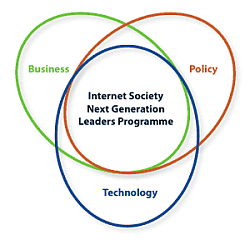
Reflection – Mueller, Franklin
The World Summit for the Information Society (WSIS) has its proponents and its detractors. More interesting than either thread of rote partisanship are the analytical accounts of its conditions and effects put forward by academics of various persuasions. Here we examine two of these positions briefly, and draw what methodological and analytical conclusions we can from their juxtaposition. Continue reading
Reflection – NWICO to WSIS
The MacBride Commission’s 1980 report to UNESCO, which formulated the basis for the New World Information and Communication Order (NWICO), and eventually for the WSIS, concentrated on global issues of media and communication. Among the many themes investigated in the report that resonate today, the role of international governance bodies for both fostering and regulating media and communications stands at the fore. In particular, a lingering dissonance between institutions’ stated purposes and their effective practices highlights the longest-standing struggles incumbent upon global IT governance.
Continue reading

Reflection – Appadurai, Pogge, Singh
The ethical position taken by academics and intellectuals with respect to the objects of their attention – research, theory, intervention – arises from a combination of environmental, institutional, and personal (i.e. political) commitments. When those commitments come into conflict, the ethical positions taken or implied by knowledge producers face the possibility of transformation. And, where globally interconnected lives at both macro- and micro-scopic levels are concerned, the conditions of possibility of change are omnipresent and intense. Arjun Appadurai (2000) summarizes the root of these conditions as a “growing disjuncture between the knowledge of globalization and the globalization of knowledge.”
Continue reading
Proposal – National Webs and Continental Institutions in the African Atlantic
The global scope of digital communications technologies arises in concert and conflict with the international institutions, policies, and market conditions that sustain the development and implementation of each layer of that technological stack. From transfer control and internet protocols to the cables themselves that provide their physical backbone, each element of contemporary information/communication technologies has undergone significant deliberation and evolution. While adoption of mature, stable ICTs continues to grow, it is not yet a fact of life for the vast majority of the world’s citizens. However, the negotiations of global governance institutions over these technologies, both private and transparent, have lasting impacts on the conditions of access to new communication opportunities and the ability to implement technological responses to developmental, political, economic, and social problems at the local level. Continue reading
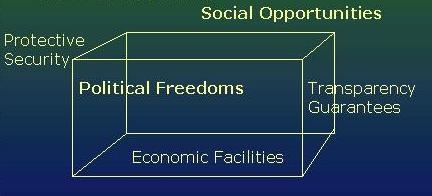
Reflection – Sen – Development as Freedom
One is struck, floating through Amartya Sen’s argument in Development as Freedom, by the sheer complexity that policymakers face when confronting entrenched conditions of poverty, inequality, and coercion. Incentives to increase productivity or efficiency in markets cannot, in themselves, abate these structural problems, because the aspects of development that bolster economic agency must simultaneously address governmental and cultural practices. Sen’s position, then, that freedom is both instrumental to development and constitutive of it, comes as a concrete and coherent rejoinder to those whose assumptions that certain cultures depend on illiberal traditions to function. Continue reading

Charts
This collection of visualizations of open data feeds some background work for the dissertation proposal. It’s an attempt to find open areas for questioning. Some issues that can be noted from these graphs: Why does the pattern of Internet adoption in the region under discussion diverge from that of the global aggregate? What are the mutual effects of human development, political changes, economic patterns, and technological movements over time? Finally, what, if anything, do these numbers tell us about the relations between those in power and those without power in the region? Though the straightforwardly quantitative measurements here appear simplistic, the concatenation of assumptions and abstractions that found them lead to further complexity, not less. So:
The relative positions of the countries that I am studying, in terms of the U.N. Human Development Index:
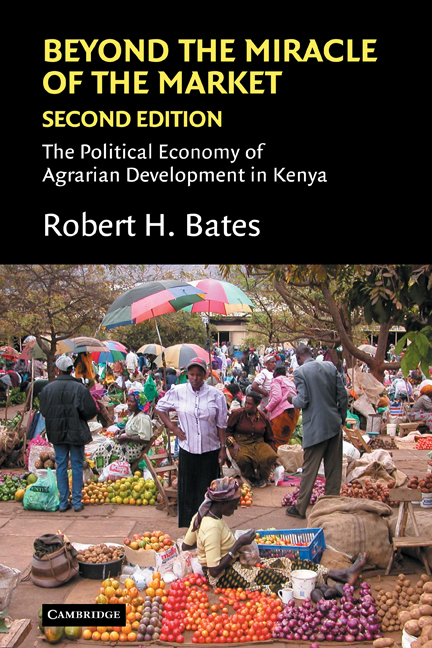
Review – Bates, Beyond the Miracle of the Market
Beyond the Miracle of the Market addresses broad questions, among which perhaps the broadest, most enduring has occupied theorists for centuries: Why do some countries succeed where others fail? To answer this in the context of late-twentieth century developing nations, Robert Bates constructs a detailed way of thinking about this central issue in economics, which troubles the very position of the State in its course. Markets, and the institutions that dominate their constituencies, take center stage here, while political and social interests form the supporting apparatus and the lenses through which to examine change in those institutions over time. In this way, Bates approaches the questions of growth, stability, and crisis in developing-nation economies without striking either condescending or dismissive tones, and without mistaking patterns for general truths. Continue reading
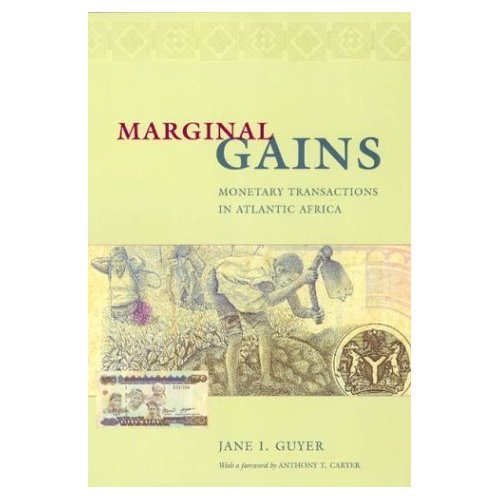
Reflection – Jane Guyer
The economic anthropology of Jane Guyer, concentrated on Africa’s western and equatorial regions, finds rich expression in this collection of the Lewis Henry Morgan lecture series delivered at the University of Rochester some fifteen years ago. Guyer’s methodological reflexivity brings her implicit and explicit critique to bear on both traditional anthropology and traditional economics, the result of which is a nuanced, multivariate logic of exchange and decision-making that brings close contextualization to the fore of questions that might otherwise veer impossibly into the abstract. Historically grounded and empirically driven, Guyer elucidates the curious interplay between formal and informal markets in Atlantic Africa, particularly the role of circulation of multiple currencies at once. Continue reading